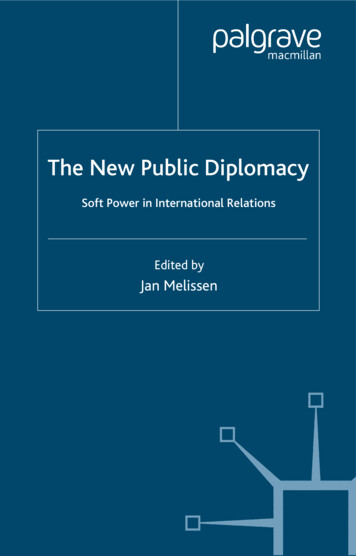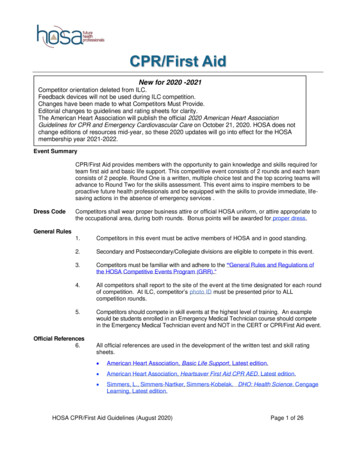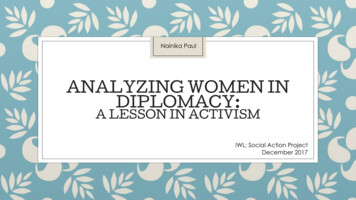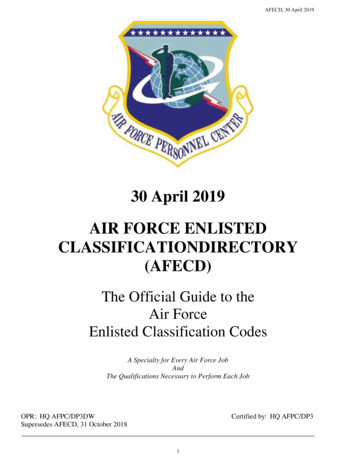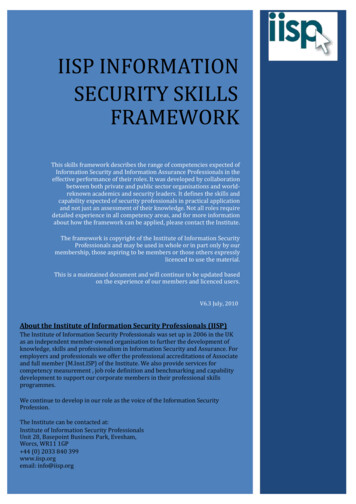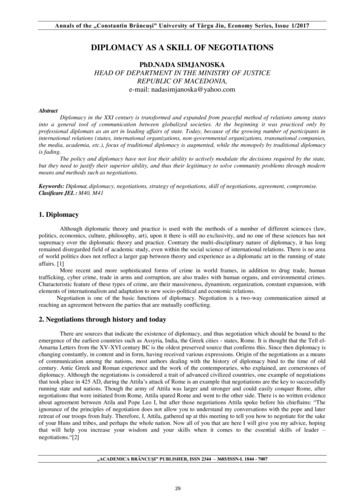
Transcription
Annals of the „Constantin Brâncuşi” University of Târgu Jiu, Economy Series, Issue 1/2017DIPLOMACY AS A SKILL OF NEGOTIATIONSPhD.NADA SIMJANOSKAHEAD OF DEPARTMENT IN THE MINISTRY OF JUSTICEREPUBLIC OF MACEDONIA,e-mail: nadasimjanoska@yahoo.comAbstractDiplomacy in the XXI century is transformed and expanded from peaceful method of relations among statesinto a general tool of communication between globalized societies. At the beginning it was practiced only byprofessional diplomats as an art in leading affairs of state. Today, because of the growing number of participants ininternational relations (states, international organizations, non-governmental organizations, transnational companies,the media, academia, etc.), focus of traditional diplomacy is augmented, while the monopoly by traditional diplomacyis fading.The policy and diplomacy have not lost their ability to actively modulate the decisions required by the state,but they need to justify their superior ability, and thus their legitimacy to solve community problems through modernmeans and methods such as negotiations.Keywords: Diplomat, diplomacy, negotiations, strategy of negotiations, skill of negotiations, agreement, compromise.Clasificare JEL : M40, M411. DiplomacyAlthough diplomatic theory and practice is used with the methods of a number of different sciences (law,politics, economics, culture, philosophy, art), upon it there is still no exclusivity, and no one of these sciences has notsupremacy over the diplomatic theory and practice. Contrary the multi-disciplinary nature of diplomacy, it has longremained disregarded field of academic study, even within the social science of international relations. There is no areaof world politics does not reflect a larger gap between theory and experience as a diplomatic art in the running of stateaffairs. 1 More recent and more sophisticated forms of crime in world frames, in addition to drug trade, humantrafficking, cyber crime, trade in arms and corruption, are also trades with human organs, and environmental crimes.Characteristic feature of these types of crime, are their massiveness, dynamism, organization, constant expansion, withelements of internationalism and adaptation to new socio-political and economic relations.Negotiation is one of the basic functions of diplomacy. Negotiation is a two-way communication aimed atreaching an agreement between the parties that are mutually conflicting.2. Negotiations through history and todayThere are sources that indicate the existence of diplomacy, and thus negotiation which should be bound to theemergence of the earliest countries such as Assyria, India, the Greek cities - states, Rome. It is thought that the Tell elAmarna Letters from the XV-XVI century BC is the oldest preserved source that confirms this. Since then diplomacy ischanging constantly, in content and in form, having received various expressions. Origin of the negotiations as a meansof communication among the nations, most authors dealing with the history of diplomacy bind to the time of oldcentury. Antic Greek and Roman experience and the work of the contemporaries, who explained, are cornerstones ofdiplomacy. Although the negotiations is considered a trait of advanced civilized countries, one example of negotiationsthat took place in 425 AD, during the Attila’s attack of Rome is an example that negotiations are the key to successfullyrunning state and nations. Though the army of Attila was larger and stronger and could easily conquer Rome, afternegotiations that were initiated from Rome, Attila spared Rome and went to the other side. There is no written evidenceabout agreement between Atila and Pope Leo I, but after those negotiations Attila spoke before his chieftains: “Theignorance of the principles of negotiation does not allow you to understand my conversations with the pope and laterretreat of our troops from Italy. Therefore, I, Attila, gathered up at this meeting to tell you how to negotiate for the sakeof your Huns and tribes, and perhaps the whole nation. Now all of you that are here I will give you my advice, hopingthat will help you increase your wisdom and your skills when it comes to the essential skills of leader –negotiations.“ 2 „ACADEMICA BRÂNCUŞI” PUBLISHER, ISSN 2344 – 3685/ISSN-L 1844 - 700729
Annals of the „Constantin Brâncuşi” University of Târgu Jiu, Economy Series, Issue 1/2017Despite the used force in relations between states in the Middle Ages, many conflicts are resolved throughnegotiations. In this period of development of diplomacy and negotiation, the church and church high dignitaries had agreat influence. During that period, special attention was attached to the selection and training of individuals on behalfof their country who will become negotiators. According to the Manual for diplomats from the seventeenth andeighteenth centuries, the perfect negotiator would have to think very quickly and also has an unlimited patience, knowhow to bypass the truth, but in the same time not to be a liar, to inspire a sincerity, while not trusted to anyone, bemodest and aggressive, to charm others, but alone is not susceptible to charm, to have enough money, not to remaincompletely indifferent to all the temptations of wealth and beautiful women. 3 Contemporary art of negotiation, especially its theory, to a large extent is the outcome of experiences frompast events, the result of the use of theoretical knowledge and practice acquired during many past crises and that is fullybased on the experiences of those events. The development of awareness among people that the clashes could lead tonuclear annihilation of mankind increasingly influenced the development of methods and ways of peaceful settlementof crises and conflicts. In our day, diplomacy has made such progress that the cooperation of states cannot imagineworking without a specially prepared and trained diplomatic network. Serious countries attach special attention to theselection and training of future diplomats.Negotiation is the fundamental means of diplomacy and other means of peaceful settlement of conflicts andcrises. Observed in a wider context negotiating is a process of communication, applicable in a number of official andunofficial occasions, mainly used for improvement of relations between the parties in the negotiations. Withnegotiations starts the process of ending of conflict and initiation of cooperation. As a rule, they represent the firstmutual activities of the parties in conflict, and that is their first contact after the collision. Negotiation is a processwhich removes or at least mitigates the antagonism. Its features include confronting between the concerned parties withthe opposing positions. Many of them are willing to name the negotiations as a technique which contributes toachieving a better quality of human relationships. Even so comprehended, or minimized as the skill, negotiationdeserves full attention of researchers. Only through negotiations between parties seeking to arrive at a mutuallyacceptable real outcome on issues of shared concern. It can be said that negotiation is a process that fulfill certainrequirements to get what we want from people who are looking for something from us. Actually, it is the process ofresolving conflicts between two or more parties when both or all parties to the dispute adapt their demands to reach amutually acceptable compromise. 4 We can still say that the negotiation process is a commonly agreement betweenparties seeking to arrive at an ideal outcome with the accessible result.Negotiation can be defined as a two-way communication aimed at reaching agreement between the partieswhich have interests that are mutual or that contradict each other. 5 This is actually a process of common decisionmaking by means of agreement and is used as in international relations, and in other spheres of human society. A basicrequirement for negotiation is the existence of communication. Negotiations are defined as a communication processbetween two or more participants which endeavor to establish a new relationship with each other, or entity whoseinterests they represent, in a peaceful way. 6 Interactions with entities on international relations and public international law are so versatile that enablesmany types of impacts to act on them. Bargaining is one of the effective ways of communicating with each other insituations when they are already in conflict.3. Strategy and skills for negotiationThe strategy of negotiating as a skill and the method can be used in different situations. Countries in thenegotiations can be: a state with a state, organization with organization, individual by individual, organization withstate, an individual organization with country, and any other combination of these categories. Negotiation is used for avariety of subjects: political, economic, legal, business-diplomacy and all other cases where there is a dispute that mustbe resolved. The strategy of negotiation is used in situations where there is a conflict, and at least two opposing sideswhich are ready to communicate with each other. The parties negotiate with the purpose of finding the best possiblesolution under the circumstances, in any case, is better than what can be achieved without negotiation. Diplomaticnegotiation skills are developed at different levels depending on the needs of specific stakeholders. Differentstakeholders sometimes have different views about method and significance of bargaining as a step towards resolvingthe conflicts.Although every negotiation has its own specificities, there are certain common features of the negotiationprocess and some common principles and practices in terms of methods and techniques of negotiation and thenecessary skills, which are applicable to all types of negotiation. There is a need to use methods of negotiation thatcontribute most to come to an agreement that would: acknowledgment of legitimate interests of the negotiating parties to a certain level;leads to justly and peaceful resolution of conflicts;realizes long-term action that will result in improvement of relationship (or maintains status quo) between thenegotiating parties.„ACADEMICA BRÂNCUŞI” PUBLISHER, ISSN 2344 – 3685/ISSN-L 1844 - 700730
Annals of the „Constantin Brâncuşi” University of Târgu Jiu, Economy Series, Issue 1/2017With the advancement of negotiating skills and using negotiation techniques and knowledge that have beendeveloped in various fields, may be achieved greater success in resolving conflicts peacefully, without using force.Nowadays negotiation skills are simultaneously developed in many areas. The most developed are the areaswhere most commonly comes to conflict - international relations. This kind of negotiation is named as a diplomaticnegotiation. The models of negotiating are mostly built on a normal situation by the interaction of the two sides. Whenit comes to diplomatic negotiations, considering the complexity of international relations, negotiations often involvemultiple parties in various combinations: the third participant as mediator to more countries in the same dispute, peaceconferences of various multilateral negotiations within or outside the international organizations or regional groups etc.As it increases the number of participants, so too does the complexity and dynamics of the negotiation process,so that the classic, limited models of joint negotiations between the two countries are not very helpful. Basically is, theexistence of desire on both side for resolving the dispute through negotiations. If there is such a wish, the method willbe found. Diplomatic negotiations are conducted due to the achievement of certain goals. The goals may be differentand in order to be achieved it is necessary to used certain negotiation strategies.It is important to understand that without communication there is no negotiation. The process of negotiation isa two-way communication in order to reach agreement. Communication may be aggravated by various obstacles. Ithappens that the negotiating parties may not communicate, not to talk with one another, but they give statements due toa third party participation or because public. Basically, in cases like that, the negotiators did not communicate directlywith the other party, nor try to convince them that their arguments are righteousness, but they are seeking to gain thesupport of domestic public or observers for their views. When you did not listen the other side, although is addressingdirectly to you, then integrative bargaining take effect. Such a move certainly does not lead to better understanding andcould jeopardize negotiations at the outset.Negotiators should pay special attention to the syndrome " keep your cheek" Above all, the proposal to beacceptable to the other side, is not enough to be reasonable and fair. From the very beginning, both parties must beinvolved in the preparation of the draft proposal, so that they will consider as the proposal belong to them. Agreementis much easier to achieve if the parties are involved in the authorship. The entire negotiating process becomesaffordable if the both sides contribute a little bit to shape the final decision. Any criticism of the proposed conditions,any suggestion, any change, each step - wearing a personal touch of the negotiators who set the final proposal. Themost important part "image storage" is actually avoiding feeling in the public that succumb to the other side. In otherwords, is wise to save the image of each of the negotiating parties to come to a situation when makes concessions to beinterpreted as "capitulating" in the domestic public. Achieving neutral solution for both sides is best solution, but if thatis not possible, you can reach a solution where no party is completely satisfied, which is better than that one side to besatisfied while the other is not . It is important that all parties made some compromise on the initial views.Emotions are an element that must not be forgotten or simply dismissed - they should always be taken intoconsideration. They are extremely limiting factor in the negotiations. An aggravating element in the decades-longnegotiations between Palestine and Israel, with the help and pressure of international mediators, is that ongoingnegotiations were suspended by publishing mutual accusations, creating relations worse than they were before thenegotiation phase. Both sides claim to believe that the other side is a danger and that there is a threat to their nationaland human existence, and that only their view is profoundly fair. It is best to peacefully react on emotional outbursts ofthe negotiators from the other side. It is important to preserve self-control, to listen peacefully the other side, notresponding to the attacks, and even sometimes to ask the interlocutor if he wanted to add something. Symbolic gesturescould contribute to the deterioration of the atmosphere. Some of them speak more clearly and have a stronger effectthan documents elaborated. Compassion by reason of loss on the other hand, a statement of regret on the occasion ofany act or incident, visiting the grave and laying a wreath at the grave of a victim may be a valuable contribution toalleviating the emotional situation and expressing good will to start a new journey.It is important to make efforts things to become more clarified, not mist up. It is better to have a proactiverather than reactive attitude. It must be realized that negotiation process is neither debate nor trial, so there is no need ofany oratorical stunts, especially using the words for blaming the other side for the problem, or even using the offend.This does not keep national dignity; it only complicates the opening process for a basis for agreement. To avoiddetrimental effect on domestic public opinion, and also on negotiations, it is sometimes useful to establish personal andconfidential communication channel with the other side. In many books about diplomacy can be found the view that thepublicity is the enemy of negotiation and that is essentially true. Confidentiality of negotiations is usuallyrecommended until they reach serious progress. It is important that the negotiation process is kept in complete control.Any uncontrolled leakage of information can seriously jeopardize not only the success of that part of the negotiationsbut, negotiating in general.The strategies and techniques of diplomatic negotiations are best displayed when communication is directlybetween the parties. Each kind of mediation or communication through other channels (media, systems of connection,written evidence, etc.) can only hinder understanding of the problem, and thus to hamper the adoption of the decisionthat is best for the stakeholders.„ACADEMICA BRÂNCUŞI” PUBLISHER, ISSN 2344 – 3685/ISSN-L 1844 - 700731
Annals of the „Constantin Brâncuşi” University of Târgu Jiu, Economy Series, Issue 1/2017Many factors can influence on the diplomatic negotiations. Some of the factors can positively influence onnegotiation process and contribute to finding an acceptable solution for all parties, while some of the factors mayinfluence the interruption of communications. One important factor is time. The timing is very significant, it isimportant to understand the concept of ripe moment as major element in the processes of starting the negotiations.Studies show that determining a "ripe moment" indicate whether there will be a conflict and to what extent. Ifnegotiations start at the beginning of the crisis, it is likely that the conflict will not escalate to level on which humanlives will be endangering. 7 The time factor may, depending on the situation, positively or negatively affect the negotiating and thepositions of the negotiating parties. Deadlines are sometimes real or imposed by the situation (e.g. the deadline foracceptance of the conditions by reason of the release of prisoners or highlighting the importance of the internationalagreement) or may be part of negotiating tactics (for example to change the announced date of coming of thenegotiators or mediators or rescheduling a meeting of important leaders). Researchers in the field of negotiationestablished a rule of thumb: 90% of actual negotiation happens in the last 10% of the total available time. 8 Thisshows that time is spent irrationally and that most of the time is used for positioning and for accusation on the otherside, rather than for request of a real solution.Тhe Language on which the negotiations are lead is very significant. Language of the bargaining is veryspecific and must meet the varied and specific requirements: to express determination and willingness to compromise,to be very precise, and vice versa (if needed) nebulous, very formal or unconventional, focused or unkempt. Of course,the problem for communications between negotiators that mother tongue is distinct can be solved in different ways.Negotiator is to communicate in different mother tongue, the tongue of the other negotiator. Apart from thequestion of prestige, it may cause other problems, especially if the mediator does not speak well enough the otherlanguage, which from the beginning gives an edge on the other side, but it can also lead to misunderstanding. When thetwo sides communicate on the third, neutral language, it is also possible to misunderstanding, depending onrepresentatives’ knowledge of understanding the language. Nevertheless, this method is frequently applied ininternational practice of negotiation, until it came to complicated formulations. Then is requested translator. Thisformula is especially used in multilateral diplomacy or bilateral talks at the highest level - not only because of fullequality, but also because the very statesmen often do not speak (or not speak well enough) foreign languages.However,the statesmen are use the service of translators who speak good foreign languages because the translationgives them more time to reflect on their own response. On the other hand, the translators themselves, though they maybe good linguists, sometimes they are not sufficiently familiar with the matter that can be very specific. Today, indiplomacy and international negotiations English language is mostly used.4. ConclusionsWhat would happen in the modern world if there is no diplomacy and diplomatic negotiation between thestates? What kind of global and regional chaos would occur and what would become with internationalcommunication? States would be set aside and left alone. They would not conclude peace agreements and negotiatewith the neighbors, would not exist a number of agreements in the field of military law, nor would exist numerousagreements which would regulate the issue of the use of certain types of weapons. In particular there would be norestriction of nuclear weapons and their use. In such an isolated world in which there would be no contacts betweencountries and which would essentially ruled international anarchy we could see way of life without diplomacy.Following the world that can create without great exaggeration to conclude that the direction in which hemoves shows the necessity of the existence of increased international cooperation, interlinking and common solution ofthe great problems of today or the future. The disarmament, terrorism, migration, hunger, environment, prevention ofdiseases, are only part of the great global challenges that require joint actions of states and where national borders arenot a barrier.Finally, we can conclude that diplomacy and diplomatic negotiations have passed the test of time and bad luckin the performance of international relations between states and other entities internationally. Diplomacy is here and itremains, the question is by whom, at what level and for what purposes she is launched. She has demonstrated itsoutstanding ability and flexibility to adapt on more changes than to die out. It is accepted and practiced by all forms ofgovernment, whether democratic or autocratic. Through experience and learning, she is transmitted to today's moderntime. Diplomatic potential, with his skill and ingenuity in special circumstances, must be adapted to the political,military and economic changes of globalization.5. Bibliography 1 Boskovic M.,"Criminal - Methodology 2", Belgrade 1996, p. 60th 2 Roberts V. (1994). Leadership Secrets of Attila the Hun. Novi Sad: Global Buk, page. 111. 3 Nirnberg Z. (2000). The art of negotiation. Belgrade: Grmech - Economic Review, p. 8„ACADEMICA BRÂNCUŞI” PUBLISHER, ISSN 2344 – 3685/ISSN-L 1844 - 700732
Annals of the „Constantin Brâncuşi” University of Târgu Jiu, Economy Series, Issue 1/2017 4 Luban D. (1985). Bargaining and Compromise: Recent Work on Negotiation and Informal Justice. Philosophy andPublic Affairs, Vol. 14. No. 4/85, Princeton, p. 416 5 Kovachevic, Z. (2004). International negotiating. Belgrade: Filip Vishnjikj, str. 25. 6 Ivanish, Z., Subotićh, D. (2006). Securty negotiation. Belgrade: Faculty of Civil Defense, p. 83rd. 7 Jackson, R. (2000). Successful Negotiation in International Violent Conflict. Journal of Peace Research, Vol. 37.No. 3/2000, London, p. 337. 8 Kovachevic Z. (2004). International Negotiating. Belgrade: Filip Vishnjic, Diplomatic Academy, str. 92.„ACADEMICA BRÂNCUŞI” PUBLISHER, ISSN 2344 – 3685/ISSN-L 1844 - 700733
necessary skills, which are applicable to all types of negotiation. There is a need to use methods of negotiation that contribute most to come to an agreement that would: acknowledgment of legitimate interests of the negotiating parties to a certain lev
